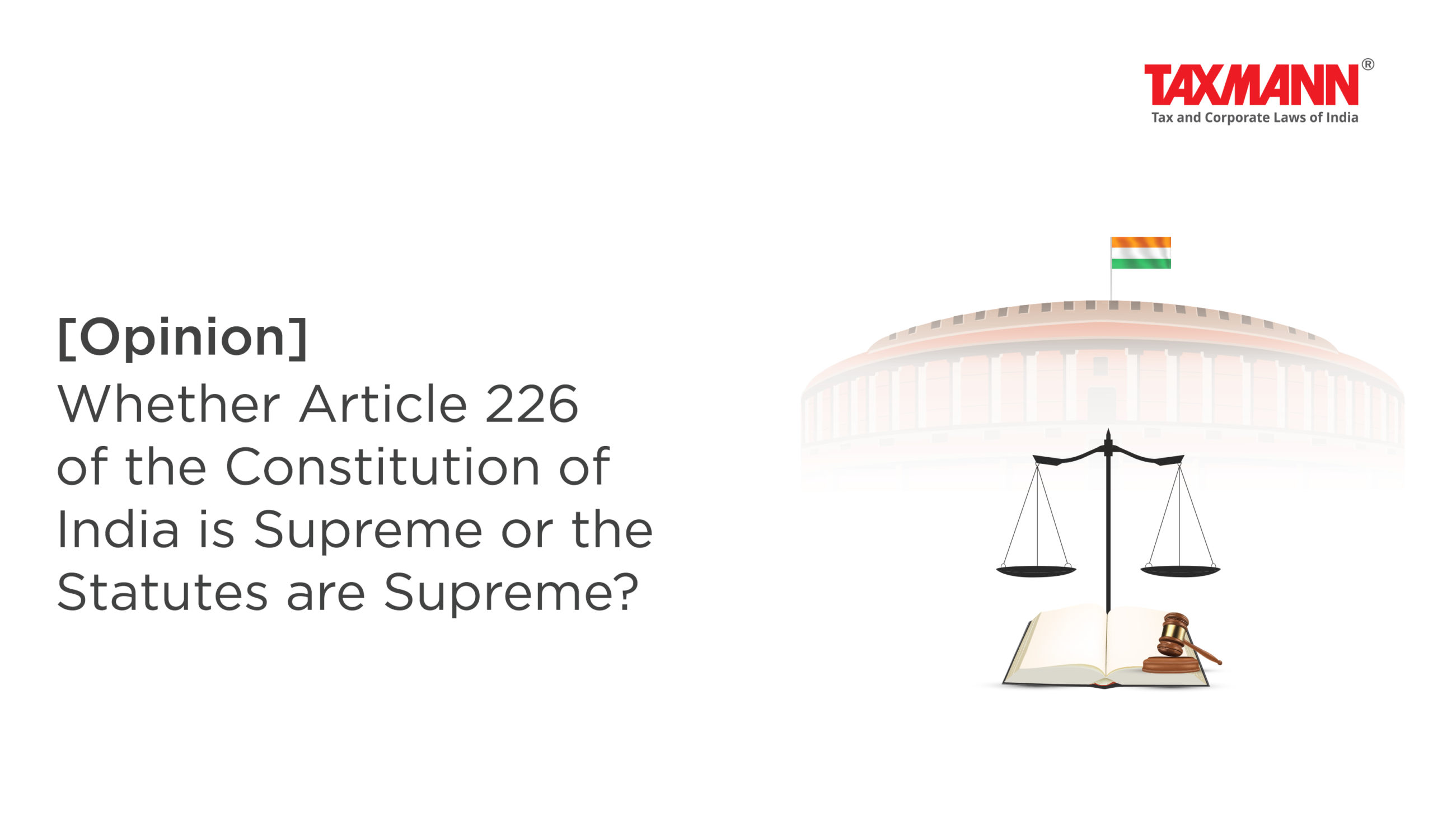[Opinion] Whether Article 226 of the Constitution of India is Supreme or the Statutes are Supreme?
- Blog|News|Income Tax|
- 3 Min Read
- By Taxmann
- |
- Last Updated on 25 May, 2023

M.V.J.K. Kumar – [2023] 150 taxmann.com 406 (Article)
The Constitution of India is framed after much deliberations by the stalewarts and the constitution makers like Dr. B.R. Ambedkar and 4 others. It was framed with preamble Sovereign Socialist Democratic Republic and was later amended by secular. It has 4 pillars and the courts constituted under chapter-V of the constitution are one of the pillars.
The Chapter-V consists of the formation of High Courts in the states and the appointment of judges and the powers of the High Courts etc. Chapter-VI consists of Sub-ordinate courts, which includes District Courts, Magistrate Courts etc.,
Supreme Court being the highest court is constituted under chapter-IV and article-32, which deals with right to constitutional remedies empowers a person or state, the remedies were enforcement of rights conferred by the constitution. Article 136 provides for a special leave to appeal before the Hon’ble Supreme Court.
Article 226: Power of High Courts to issue certain writs:
1. Notwithstanding anything in article 32, every High Court shall have powers, throughout the territories in relation to which it exercises jurisdiction, to issue to any person or authority, including in appropriate cases, any Government, within those territories directions, orders or writs, including “(writs in the nature of habeas corpus, mandamus, prohibition, quo warranto and certiorari, or any of them, for the enforcement of any of the rights conferred by Part II and for any other purpose)
2. The power conferred by clause (1) to issue directions, orders or writs to any Government, authority or person may also be exercised by any High Court exercising jurisdiction in relation to the territories within which the cause of action, wholly or in part, arises for the exercise of such power, notwithstanding that the seat of such Government or authority or the residence of such person is not within those territories.
3. Where any party against whom an interim order, whether by way of injunction or stay or in any other manner, is made on, or in any proceedings relating to, a partition under clause (1), without –
(a) furnishing to such party copies of such petition and as documents in support of the plea for such interim order; and
(b) giving such party an opportunity of being heard, makes an application to the High Court for the vacation of such order and furnishes a copy of such application to the party in whose favour such order has been made or the counsel of such party, the High Court shall disposed of the application within a period of two weeks from the date on which it is received or from the date on which the copy of such application is so furnished, whichever is later, or where the High Court is closed on the last day of that period, before the expiry of the next day afterwards on which the High Court is open; and if the application is not so disposed of, the interim order shall, on the expiry of that period, or, as the case may be, the expiry of the said next day, stand vacated)
4. The power conferred on a High Court by this article shall not be in derogation of the power conferred on the Supreme Court by clause (2) of article, 21.
Click Here To Read The Full Article
Disclaimer: The content/information published on the website is only for general information of the user and shall not be construed as legal advice. While the Taxmann has exercised reasonable efforts to ensure the veracity of information/content published, Taxmann shall be under no liability in any manner whatsoever for incorrect information, if any.

Taxmann Publications has a dedicated in-house Research & Editorial Team. This team consists of a team of Chartered Accountants, Company Secretaries, and Lawyers. This team works under the guidance and supervision of editor-in-chief Mr Rakesh Bhargava.
The Research and Editorial Team is responsible for developing reliable and accurate content for the readers. The team follows the six-sigma approach to achieve the benchmark of zero error in its publications and research platforms. The team ensures that the following publication guidelines are thoroughly followed while developing the content:
- The statutory material is obtained only from the authorized and reliable sources
- All the latest developments in the judicial and legislative fields are covered
- Prepare the analytical write-ups on current, controversial, and important issues to help the readers to understand the concept and its implications
- Every content published by Taxmann is complete, accurate and lucid
- All evidence-based statements are supported with proper reference to Section, Circular No., Notification No. or citations
- The golden rules of grammar, style and consistency are thoroughly followed
- Font and size that’s easy to read and remain consistent across all imprint and digital publications are applied



 CA | CS | CMA
CA | CS | CMA
